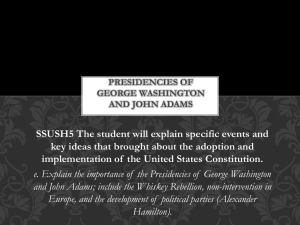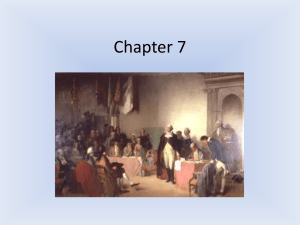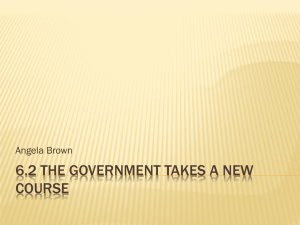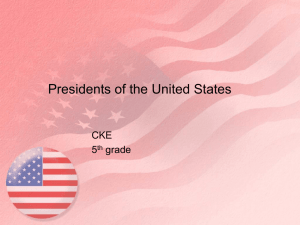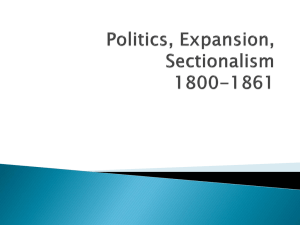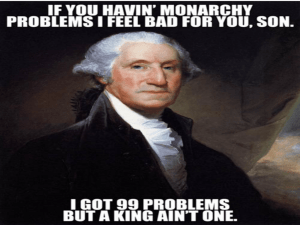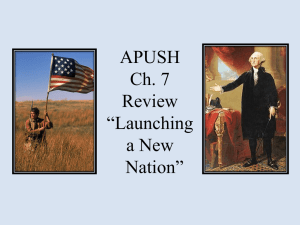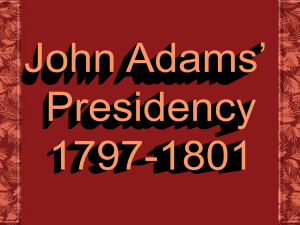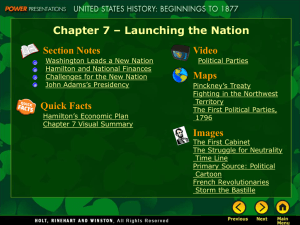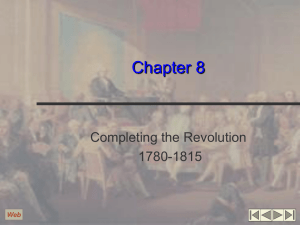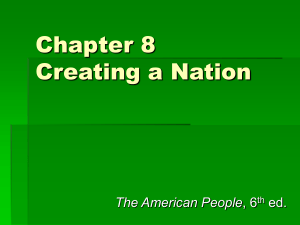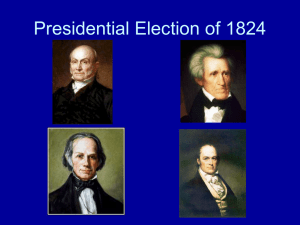AP - C7 Notes _3 - Gatesville High School
advertisement
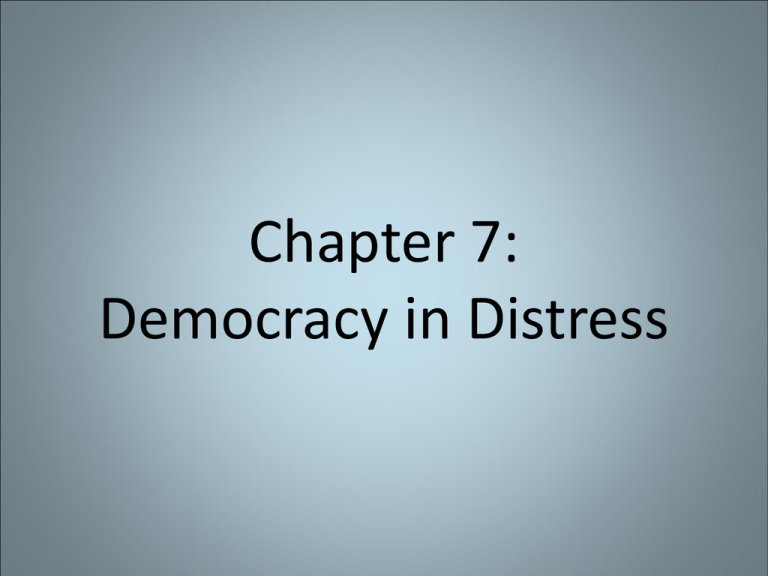
Chapter 7: Democracy in Distress Popular Political Culture • partisan – partial to a specific party or purpose • even though members of Congress were voting as Republicans or Federalists they condemned the partisan spirit as a threat to the stability of the United States – viewed a “party” with “faction” and “faction” with “conspiracy to overthrow legitimate authority” • created an atmosphere that bred suspicion Partisan Newspapers and Political Clubs • more than any other element, newspapers transformed the political culture • Americans were voracious readers • John Fenno – Gazette of the United States • Philip Freneau – National Gazette – tone of the two publications was quite different, they were fiercely partisan journals presenting rumor and opinion as fact • some of the precursor to ‘yellow journalism’ • Noah Webster – spent the 1790s editing a Federalist journal called the American Minerva – would later publish An American Dictionary of the English Language • during this time you also had the birth of political clubs “Democratic” or “Republican” associations Whiskey Rebellion Linked to Republican Conspiracy • the Federalists convinced themselves that the Republicans were prepared to use violence against the U.S. government • farmers in Pennsylvania protested an excise tax on distilled whiskey passed by Congress in 1791 – excise – an internal tax or duty on certain commodities, levied on the manufacture, sale, or consumption of the product • were making good money distilling their grain into whiskey and didn’t want the excise to put them out of business • the insurrection represented a direct political challenge • President Washington called out 15,000 militiamen and marched against the rebels – expedition was an embarrassing fiasco resulting in minimum violence as the distillers disappeared • victory in the rebellion and the rebellion itself intensified the split between the two parties Washington’s Farewell • in September 1796, Washington published his Farewell Address declaring his intention to retire from the presidency – set the precedent for presidents to serve 2 terms • in the address, Washington warned against all political factions, counseled the US to avoid any permanent alliances – would become the basis for American neutrality and isolationist sentiment for many years The Adams Presidency • Federalists agreed that John Adams should stand against the Republican Thomas Jefferson – Hamilton feared thought that an independentminded Adams would be difficult to manipulate • each elector cast 2 ballots and the person who gained the most votes became president • runner-up, regardless of party affiliation became vice-president The Election of 1796 Candidate Party Electoral Vote J. Adams Federalist 71 Jefferson Republican 68 T. Pinckney Federalist 59 Burr Republican 30 • Hamilton secretly urged southern Federalists to support only Pinckney, even if that meant throwing away their second vote • when New Englanders heard of Hamilton’s plan, they dropped Pinckney and voted only for Adams – this would heighten tensions within the Federalist party • Adams was saddled with the members of Washington’s old cabinet – a group that would regularly consult Hamilton behind Adams’s back – but, if Adams had dismissed them and called his own cabinet he would have called Washington’s judgment into question and Adams would not take that highly public risk John Adams – Second President • Adams also had to work with a Republican vicepresident The XYZ Affair and Domestic Politics • French government regarded Jay’s Treaty (with Great Britain) as an affront – allowing Great Britain to define the conditions for neutrality, the US had sided with them against France • in 1797, French privateers began seizing American ships – neither the US or France officially declared war, and this became known as the Quasi-War • Adams did not want to escalate the conflict – he dispatched a special commission in a final attempt to solve the problem • negotiating team was made up of Charles Pinckney, John Marshall, and Elbridge Gerry – were instructed to obtain compensation for the ships seized as well as release from the treaties of 1778 – the group would also offer France the same commercial privileges as Great Britain • while the diplomats negotiated in France, Adams talked of strengthening American defenses to placate the more militant members of his own party • when the commission arrived in France, instead of dealing with Talleyrand (the minister of foreign relations), they met with obscure intermediaries who demanded huge bribes – Talleyrand would not open negotiations unless he was given $250,000 – the French government also expected a “loan” of millions of dollars • the American negotiators refused to play along – “Millions for defense, not one cent for tribute.” French Minister Talleyrand • when Adams presented the official correspondence from the negotiations, the names of Talleyrand’s lackeys was changed to X, Y, and Z A 1798 political cartoon, depicting America – the young maiden, being plundered by five Frenchmen who represent the five directors of the French government. Crushing Political Dissent • Federalists assumed that Adams would be asking Congress for a formal declaration of war • began pushing for a general rearmament – new fighting ships – additional harbor fortifications – greatly expanded U.S. Army • Adams remained skeptical and saw no likelihood of French invasion • the army was not necessarily to stop French aggression, but to stop internal opposition • in the summer of 1798, a provisional army was created under the leadership of George Washington Alexander Hamilton – who agreed to take the position if Hamilton was appointed his second in command – Hamilton wanted military glory for himself, but continued to treat the president with contempt • Hamilton could make no move without presidential cooperation – Adams was in fact the Commander in Chief – whenever questions about the army came up, Adams was nowhere to be found • he supported the navy and pushed Congress to establish the Navy Department – selecting Benjamin Stoddert for this new cabinet position – a person who did not take orders from Hamilton • Adams refused to ask Congress for a formal declaration of war • the American people increasingly regarded the idle army as an expensive extravagance Silencing Political Opposition: the Alien and Sedition Acts • group of bills known as the Alien and Sedition Acts authorized the use of federal courts and the powers of the presidency to silence the Republicans • were born of fear and vindictiveness and would become the nation’s first major crisis over civil liberties Alien Acts • 1. Alien Enemies Law – gave the president extraordinary wartime powers – could detain or deport citizens of nations which the US was at war and who behaved in a suspicious manner • 2. Alien Law – empowered the president to expel any foreigner from the US simply by executive decree – was limited to two years, but the mere threat of arrest caused some Frenchmen to flee the country • 3. Naturalization Law – established a fourteen year probationary period before foreigners could apply for full US citizenship – designed to keep “hordes of wild Irishmen” away from the polls as long as possible Sedition Act Cutout of a newspaper broadside on the trial of Thomas Cooper, a lawyer and newspaper editor who was indicted, prosecuted, and convicted of violating the Sedition Act. • defined criticism of the U.S. government as criminal libel and citizens found guilty by a jury were subject to fines and imprisonment – many Republicans were concerned that the Sedition Law undermined rights guaranteed in the First Amendment – were also worried about the federal judiciary’s expanded role in punishing sedition • believed such matters were best left to state officials • Matthew Lyon – Republican congressman who publicly accused Adams and his administration of mishandling the Quasi-War • was known as the “Spitting Lyon” after who spat in the eye of a Federalist congressman – also took part in a fistfight on the floor of Congress • Federalist court was happy to have the opportunity to convict him of libel – but while he sat in jail, his constituents re-elected him • federal courts had become political tools • the efforts at enforcing the Sedition Law did not silence opposition – they actually sparked more criticism and created martyrs • Republicans feared that the survival of free government was at stake Kentucky and Virginia Resolutions James Madison • Thomas Jefferson and James Madison were convinced that the Federalists wanted the creation of a police state • some extreme republicans like John Taylor of Virginia recommended secession from the Union • others supported armed resistance • Jefferson counseled against extreme measures • Jefferson and Madison would draft separate protests known as the Virginia and Kentucky Resolutions – vigorously defended the right of individual state assemblies to interpret the constitutionality of federal law – Jefferson would flirt with the doctrine of nullification • a concept as dangerous to the survival of the U.S. as anything advanced by Hamilton or the High Federalists • Kentucky Resolution (Thomas Jefferson) – described the federal union as a compact – states did give the national government explicit powers, but rights not specifically mentioned in the Constitution belonged to the states – the “general welfare” clause – Kentucky legislators believed that the Alien and Sedition Acts were unconstitutional and ought to be repealed • Virginia Resolution (James Madison) – took a more temperate stand – urged the states to defend the rights of the American people – resisted the notion that a single state legislature could or should have the authority to overthrow federal law 15 Star 15 Stripe Flag used after Vermont and Kentucky joined the Union in 1791 and 1792. • the resolutions were not intended as statements of abstract principles and most certainly not a justification for southern secession • showed American voters that the Republicans offered a clear alternative to Federalist rule Adam’s Finest Hour • President Adams declared his independence from the Hamiltonian wing of the Federalist party, he had little enthusiasm for war • after the XYZ Affair, Adams received reports that Talleyrand had changed his tune – the bribery episode had been an unfortunate misunderstanding and if the US sent new representatives, he was prepared to negotiate in good faith • with peace in the future, American taxpayers complained more and more about the cost of maintaining an army – the president was only too happy to dismantle Hamilton’s dream • William Vans Murray, Oliver Ellsworth, and William Davie arrived in France November of 1799 and found a new government in power, led by Napoleon Bonaparte • Convention of Morfontaine – French refused to compensate the Americans for vessels taken during the Quasi War – did declare the treaties of 1778 null and void – removed annoying French restrictions on U.S. commerce – Adams efforts would also create an atmosphere of mutual trust that paved the way for the purchase of the Louisiana Territory The Peaceful Revolution: The Election of 1800 • on the eve of election, the Federalists were divided – Adams enjoyed popularity among the everyday Federalist – party leaders like Hamilton wanted to punish him for his betrayal of their militant policies • Hamilton attempted to rig the election again so that the Federalist party vice-presidential candidate Charles Cotesworth Pinckney would receive more ballots than Adams and save America from Jefferson The Election of 1800 Candidate Party Electoral Vote Jefferson Republican 73 Burr Republican 73 J. Adams Federalist 65 C. Pinckney Federalist 64 • things did not go as Hamilton had planned – Jefferson and his running mate Aaron Burr tied • the election then went to the House of Representatives, a lame-duck body still controlled by members of the Federalist party • each state delegation cast a single vote, with nine votes needed for election • after dozens of ballots the House had still not selected a president and the drama dragged on for days – Burr refused to withdraw • leading Federalists decided that Jefferson would make a more responsible President and James Bayard of Delaware switched his vote giving Jefferson the election • Twelfth Amendment – ratified in 1804, saved America from repeating the election of 1800 – the electoral college would now cast separate ballots for president and vice-president Aaron Burr • in the final days of his presidency, Adams appointed as many Federalists as possible to the federal bench the “midnight judges” – one of these, John Marshall, would become chief justice of the United States • Adams never forgave Hamilton for his actions during Adams term of office Chief Justice John Marshall Danger of Political Extremism • the election of 1800 needs to be remembered for what did not occur: – no riots in the streets – no attempted military coup – no secession from the Union – nothing but the peaceful transfer of power from one political party to an opposition party
